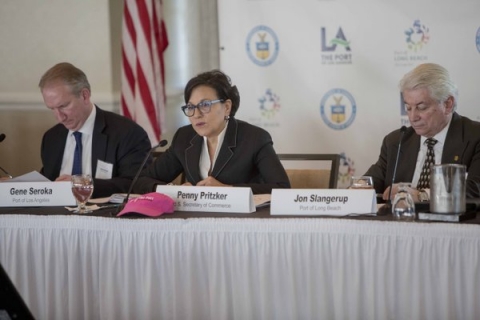Apr212016
Posted at 6:48 PM
On April 15, Secretary Penny Pritzker traveled to the Ports of Los Angeles and Long Beach to convene the first of a series of regional port and supply chain competitiveness roundtables that the Commerce Department is holding in key ports around the United States.
The Department’s goal is to ensure that America’s seaports and their supply chains have the tools needed to strengthen U.S. supply chain competitiveness, reduce port congestion, facilitate international trade, and catalyze regional and national economic growth and job creation.
America’s seaports are crucial generators of economic development and well-paying jobs, both in and around ports and along the entire supply chain. As last year’s national port congestion and slowdown demonstrated, what happens at any one port, or group of ports, can have far-reaching and nationwide effects on all of America’s ports and the companies and stakeholders that use and rely on them.
However, U.S. seaport efficiency is hampered by a variety of factors, only some of which are directly under a seaport’s control. Larger vessels, growing trade volumes, insufficient infrastructure, operating inefficiencies and lack of communication and collaboration can all slow the movement of trade to and through America’s seaports. These factors can lead to congestion that can dramatically reduce the flow of trade to and through our ports, ultimately resulting in lost sales, lost markets, and lost jobs across the United States, as well as the loss of U.S. supply chain competitiveness in the global marketplace.
To address these concerns, the Department of Commerce today launched the first in a series of regional port and supply chain competitiveness roundtables. By meeting with ports and their stakeholders in key ports across the United States, the Commerce Department hopes to learn what leading U.S. seaports are doing, together with their stakeholders, to improve their ability to coordinate and collaborate towards identifying and resolving operational port and infrastructure inefficiencies that negatively impact trade flows and cause congestion. The Commerce Department also hopes to learn what additional steps could be taken to improve port/stakeholder collaboration and partnerships, as well as to improve investment in port infrastructure, equipment, and technology.
Last month, Secretary Pritzker joined Transportation Secretary Foxx and Labor Secretary Perez at a 21st Century Ports roundtable in Baltimore, Maryland. At that event, Secretary Pritzker pledged to continue outreach and dialogue to ports across the United States.
At the Los Angeles roundtable, labor and management announced plans to consider extending the new West Coast longshore contract now - well in advance of its 2019 expiration – underscoring the importance of open dialogue and working together. Participants also discussed instances in which communication, collaboration, and information-sharing have improved port efficiency and the flow of trade.
During the roundtable, Secretary Pritzker announced that the Department will shortly issue a Federal Register notice that seeks public input on these port congestion and efficiency issues. The results of the roundtables – together with the information obtained from the Federal Register notice - will be used to develop a best practices report for U.S. seaports that will be released in late 2016.


